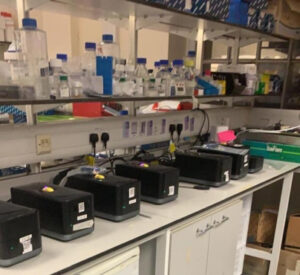Following Complaints from Customers, a UK Covid Test Provider Admits Tests Cannot Be Used to Diagnose Covid
Sun 12:22 pm +01:00, 2 Jan 2022

DnaNudge is an Imperial College London spinout company whose founder and CEO is a professor at Imperial College. At the end of December 2020 in response to complaints from its customers, who at the time was mainly the NHS, DnaNudge admitted a final Covid diagnosis should consider symptoms and not rely on the test result alone.
A list of field safety notices (“FSNs”) from medical device manufacturers is maintained by the Medicines and Healthcare products Regulatory Agency (“MHRA”). In a previous article we attached a list of 24 FSNs relating to “SARS” devices between 1 January and 30 November 2021 – 15 of them relate specifically to PCR Tests and at least one relates to a lateral flow antigen test, two of these were issued by DnaNudge.
DnaNudge has a creepy sales pitch: “Here at DnaNudge, we’ve pioneered something completely new – the ability to nudge your everyday shopping choices through your DNA,” their online shop says. It is a company that was formed in 2015 and founded by Chris Toumazou, Regius Professor of Engineering Imperial College London, and Dr. Maria Karvela. DnaNudge’s two recently appointed directors are: Sir Richard Sykes, chair of the UK’s Vaccine Taskforce who was appointed as director of DnaNudge in December 2021; and, Mohammed (“Mo”) El Husseiny, founder of Ventura Capital.
Their ‘lab in a cartridge’ device was approved for clinical use by the MHRA at the end of April 2020 and in August 2020, the UK government purchased 5.8m DnaNudge Covid tests, at a cost of £161m or just under £28 each, to be rolled out in patient care and elective surgery settings.
A couple of months later, in October, DnaNudge entered into a deal with manufacturer Jabil Healthcare to produce 1.4 million “CovidNudge” test cartridges per month by early 2021. A move to expand their customer base is motivated by money. The units are being sold to NHS hospitals at cost price, Prof. Toumazou said, “We’ve sold it at cost to the NHS as a philanthropic thing, but our consumer business [on other products] is suffering because we haven’t put the resources into that.”
Formerly Nypro, Jabil Healthcare’s website states that it serves five key sectors in the healthcare market: medical devices, orthopedics; diagnostics; pharmaceutical delivery systems; and, consumer health. Adding that “taking centre stage are Internet of Things (IoT) and digital health platform innovations enabled by connectivity, sensors and miniaturisation.”
In early November 2020 DnaNudge announced their Covid test was available for people without Covid-19 symptoms. The test is able to return results in 90-minutes and up to 10 people in a work, friends, family or other close contact “bubble” can be tested at the same time on the same cartridge, at a cost of £10 per person.
On 22 December 2020, DnaNudge issued its first FSN which affected all batches. DnaNudge’s customers had complained there was a disconnection between the blue top cover and the clear bottom cover of the “DNACartridge.” “If any cartridges are identified with loose or missing lids, DO NOT attempt to replace the lid, please dispose of the item appropriately and continue testing with a new cartridge,” DnaNudge instructed.
But there were further problems and DnaNudge’s customers complained once again. This time the “DNACartridges” reported a negative result when a blank swab was inserted. Their customers had identified 20 such batches. So, DnaNudge issued its second FSN on 4 January 2021.
“Even in the presence of a negative result, a final diagnosis of the patient should consider all factors such as patient symptoms and context of admission, and not just the test result alone. No test is 100% accurate and a negative result does not rule out infection with SARS-CoV-2,” DnaNudge advised.
A final diagnosis “should consider all factors such as patient symptoms and context of admission, and not just the test result alone.” Wait … are these the same tests that two months prior had been reported as “available for people without Covid-19 symptoms”?
Reading the extract from DnaNudge’s website below, it would seem so.
So, hospitals and clinical settings should diagnose according to symptoms and context of admission but the public, specifically those without symptoms, should self-diagnose on Covid test alone.
And here’s another thing. Why is it that problems with their products only seem to be picked up by their customers and not DnaNudge’s own quality control?
And the questions don’t stop there. When DnaNudge issues an FSN, and people have bought these tests to be used in their “bubble” or for travelling purposes, how is information in the FSN being passed onto their customers who are the public? It may be because only those without symptoms, healthy people, are advised to use DnaNudge’s Covid test so it’s irrelevant, from controlling an infectious disease standpoint at least, whether the test returns positive or negative.
In August 2021, DnaNudge secured a £43.6 million investment led by Ventura Capital – the company founded by Mo El Husseiny who is also, since May 2021, the Vice Chairman of DnaNudge.
Despite clinical settings not being able to rely on it for diagnosis and that outside a clinical setting only healthy people are able to use it – both scenarios rendering the test useless – in December 2021, “consumer genetic testing pioneer DnaNudge” announced a key partnership with DAM Health that will see DnaNudge’s 90-minute PCR Covid-19 test deployed across more than 100 clinics in the UK and internationally in 2022.
DAM Health states on its website that it is one of the leading providers in the UK for Covid testing solutions. It is a UK company incorporated on 6 December 2020. “If you wish you can receive your COVID-19 test results in your Health Passport Worldwide account,” Dam Health declares.
You couldn’t make it up.
Further reading: Did the Government waste £161m in Moonshot money?

https://dailyexpose.uk/2022/01/02/following-complaints-from-customers-a-uk-covid-test-provider-admits-tests-cannot-be-used-to-diagnose-covid/



